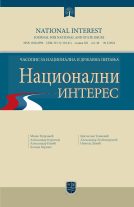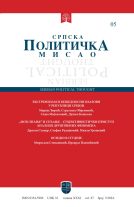- Home page
- Researchers
- Miša Đurković
Miša Đurković
Institute for European Studies, Belgrade

POBEDONOCSEV AND CRITICISM OF MULTI-PARTY REPRESENTATIVE DEMOCRACY
The author deals with the work of Konstantin Pobedonostsev and especially his criticism of multi-party representative democracy. Usually, his refusal to introduce democracy and advocacy of self-states and imperial autocracy are interpreted as personal interests, reactionary, backwardness, etc. But here we show that it was an extremely educated man who was a Westerner by education and who closely followed the development and problems of the Western representative system. The author shows that his work in this field is part of the overall European intellectual debate on changing the system of democracy in the age of mass parties. Following Polunov's work, which showed Western influences on Pobedonostsev's thought, we place his work and argumentation in the context of the Western canon of criticism of multipartyism, which includes Ostrogorski, Belok and Michels, whose works were published years after the Moscow Collection.

BLACK MIRROR, ENHANCEMENT AND THE IMPOSSIBILITY OF FORGETTING
Modern cognitive and experimental science is increasingly working to explore the meaning and importance of forgetting. Forgetting happens to be one of the most important mental functions on an individual level, but also on social and national ones, since it enables healing, purification of thoughts from difficult memories, prevents obsession with problems, and eliminates the possibility of psychosomatic illnesses. The famous British TV series Black Mirror, which has become a symbol of the challenges that modern and futuristic technology brings to man, in a number of episodes deals with the problems that arise due to the obsession of gadget culture with abolishing of forgetting through technological enhancement. Several episodes are based on gadgets that expand memory and make it constantly available to a whole range of other subjects to whom data from people's history is available. In a dialogue with Brooker's ideas, the author re-examines the problems spawned by this future society without forgetting and searches for a possible solution.

The Political Dimension in the Work of the International Tribunal for the Former Yugoslavia: ICTY as a Form of Political Justice
In 1961 Otto Kirchheimer published his book Political Justice. The book was trying to illustrate how laws and courts are being used in political struggle. In this article, the author tries to apply this concept to the work of International Criminal Tribunal for Yugoslavia, and he tests the hypothesis claiming that transitional justice in ICTY case actually became political justice. He focuses on the ways in which ICTY was used as a tool of great powers to manipulate and influence political processes in the countries of former Yugoslavia that were subjected to it. The timing of issuing indictments, the length of the processes, the threats of indicting as a pressure, verdicts, work of appeal councils, etc, have been massively used as tools against political actors and the states during the work of ICTY. Justice was also used as a conditionality instrument during the process of European integration which also makes it a form of political justice. The author concludes by explaining why ICTY rose serious reservations among peoples of former Yugoslavia about the concept of transitional justice and the ways in which it is implemented, seeing in it plenty of elements of political justice.
